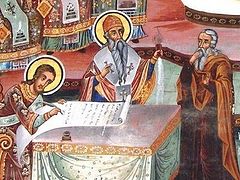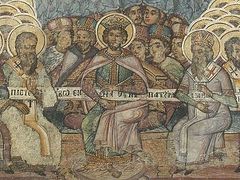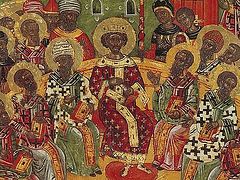For there are three that bear record in heaven, the Father, the Word, and the Holy Spirit: and these three are one! (1 Jn. 5:7)
Beloved faithful!
Today, on the Seventh Sunday of Holy Pascha, the Orthodox Church celebrates the First Ecumenical Council of the Christian world, held in 325 in the city of Nicaea, to condemn the heresy, that is, the mistaken, heretical teaching of Arius. The council was organized by the holy Emperor Constantine, the first Christian emperor in the world (306-337), and his mother Helen, at the request of the holy fathers of that time.
What is an ecumenical council? It is a gathering of all the major Orthodox hierarchs—the bishops, metropolitans, and patriarchs of the whole world—to discuss some unclear teachings of the Christian faith and fix them in clear, immutable laws, called dogmas. An ecumenical council also judges and condemns all deviations from the faith, alien to the teachings of the Holy Gospel and the holy fathers, and excludes from the Church, that is, anathematizes, all heretics, tearing at the unity of the Church’s faith, symbolized by the Lord’s linen tunic, woven from a single piece, as the Holy Gospel says: Now the coat was without seam, woven from the top throughout (Jn. 19:23). By the word “heresy” we mean someone’s personal opinion or teaching about God contrary to the true teaching of the Church of Christ.
Why was the First Ecumenical held? What caused the holy fathers to gather together and protect the true faith? The reason was the appearance of a great heretic, namely Arius, who was teaching Christians a new faith: that the Son of God is not consubstantial with the father and that “there was a time when the Son was not.” He called Jesus Christ “the highest creature,” and “the first of creatures.”
This heretic was a priest from Alexandria, and Egyptian, very proud and disobedient, although a good preacher, and lived in the third-fourth centuries. His heresy spread so much for a few years that it began to tear the Church in two and threatened to spread throughout the entire Roman Empire, both East and West.
The holy fathers, no longer able to endure Arius’ blasphemy against the Savior and the All-Holy Trinity, began to ask for help from the pious Emperor Constantine the Great, that he would help calm the Church of Christ by his imperial authority, and condemn the blasphemous teachings of Arius and his followers. Inspired by the Holy Spirit, the great Christian emperor decided to organize the First Ecumenical Council in Nicaea in 325, at the empire’s expense, and invited all the major hierarchs of the Christian Church from both East and West. It was attended by 318 holy fathers, to which was added the delegation of Pope Sylvester I of Rome, as the Christian Church was one until 1054, not yet divided into two—the Orthodox East and the Roman Catholic West. Therefore, the councils taking place before the splitting of the Church are called “ecumenical,” that is, “universal,” inasmuch as hierarchs of the Church of Rome participated in them.
The Nicaean Council was opened by Emperor Constantine and Empress Helena themselves and lasted all summer. During the council, at which the heretic Arius and his ilk were also present, the holy fathers greatly labored to convert the heretics to Orthodoxy, but they did not want to listen to them. Moreover, it happened that during the discussion, St. Nicholas gave Arius a slap, unable to bear his blasphemy. Then St. Constantine the Great ordered that his omophorion and Gospel be taken away and he be thrown into prison for daring to raise a hand. However, the Savior appeared to him at night in prison and again presented him the Gospel, and the Mother of God laid the omophorion upon his chest. In the morning the emperor, having heard about it, led St. Nicholas to the council, and all asked his forgiveness, seeing his zeal for the faith and his patience.
Also St. Spyridon, desiring to enlighten Arius as regards the mysteries of the All-Holy Trinity and that all three Person are consubstantial and equal in honor, took a burned brick, and, having made the sign of the holy cross, gripped it, and then fire, burning the brick, leapt skyward, water spilled on the ground, and the clay remained in his hands. The brick was a symbol of the All-Holy Trinity: The fire represented the Father, the clay the Incarnate Son, and the water the Holy Spirit, the Comforter, sent into the world.
The 318 holy fathers anathematized the heretic Arius and his blasphemous teachings at the council. The fathers established the dogma that the three Persons of the All-Holy Trinity—the Father, the Son, and the Holy Spirit—are of one essence and undivided. The first part of the Creed—its first seven articles, on the Father and the Son—was composed at the council. The last five articles, about the Holy Spirit, were composed at the Second Ecumenical Council in 381. The Creed contains the dogmas of the Orthodox faith in short form, and it is read every day in churches and Christian homes as the confession of the apostolic faith.
Although Arius was sent into exile in places lying south of the Danube, he did not want to submit himself to the Church, and moreover, he tried to sow his blasphemous teaching among all Christians. Therefore, he was severely punished by God, such that his bowels fell out and he died a terrible death, to his eternal condemnation in hellish Gehenna.
Beloved faithful!
Although the heretic Arius, that greatest heretic in Christendom, and his heresy disappeared, the Church of Christ has been constantly struck by new sects and heresies throughout the ages, some more dangerous than others. The most serious division in the Christian Church took place in 1054, when the schism between the East and West occurred, and there thus arose two different churches: the Orthodox with its center in Constantinople, and the Roman Catholic with its center in the Vatican (Rome).
The Catholic Church, in its turn, has undergone two more heresies and schisms. I’m speaking about Luther—the second Arius—and Calvin in the sixteenth century, after whom about a century later followed the Anglican schism of the seventeenth century. The first heresy grasped nearly every country of Northern Europe—the so-called Protestant countries; and the Anglican religion spread in England, North America, and Australia, forming the Anglican church.
Do you see how Satan has managed to tear Christ’s garment, that is, to divide and break the unity of the Church founded by Him? We all confess one Lord, one faith, one Baptism, although because of the pride of heresiarchs, replacing the teaching of the Orthodox, apostolic faith with new dogmas, composed by their own reason, and also because of all of our sins, in the last several centuries there has existed several Christian churches: two apostolic—the Orthodox and Catholic—and three having no apostolic succession: the Protestant, the Reformed, and the Anglican.
However, religious dissensions did not end here. Beginning with the eighteenth century, and especially with the nineteenth, in America and in Western Europe there began to appear new religious factions, isolated from the body of the apostolic Church, known as sects.
Today there are thousands of Christian sects and religious factions in the world, each one more fanatical and dangerous, such as the Jehovah’s Witnesses, and there’s the Church of Satan with its so-called Black Mass, where they worship the devil instead of God. They look for new members among the curious faithful, those who have been disciplinarily punished by Christ’s Church (receiving a penance), the poor, who they promise material aid, and especially among the young, who are easiest of all to corrupt.
Let us pay heed for ourselves and for our Orthodox families. The multiplication of sects is a clear apocalyptic sign, heralding the end of the ages.
The first duty of the sons of the Orthodox Church is to know the Holy Scriptures, Holy Tradition, the catechesis, and the foundational writings of the holy fathers as well as possible. The second duty, if it’s not the first, is to live with great faith in God and to lead a religious life in our families with zeal and piety, with perfect virtue. The sects demand theory from us, attacking us with texts from the Holy Scripture. But we should answer them not with words, not so much with Biblical texts as with the moral life—with humility, purity, and holiness. Words cannot replace deeds. Seeing honest Christians, merciful and pious, sectarians are shamed and silenced.
Our third great duty is to raise our children in the fear of God, with great care and attention. After all, if we don’t educate them as we should, or we tempt them with our own lives, then we kill their souls, they no longer belong to us, and they can be easily led astray by sects, the passions, drunkenness, lust, and unbelief. A young person, having fallen once, is difficult to save and to tear away from a sect.
Children, as well as parents, from a young age should know the Our Father, the Creed, and Psalm 50, and draw principal knowledge about religion from an Orthodox catechism. He who does not know at least these three prayers by heart cannot be communed of the Holy Mysteries.
Another great duty of Orthodox Christians is to be people of prayer, for we can do nothing without it. Allow no one to miss the holy Liturgy and homily on feast days, except for cases of extreme necessity. Prayer with faith, fasting, and tears—this is our life, our spiritual bread, and our salvation. And then we must live with all people in love, especially with our household, and give alms according to our ability, for it covers a multitude of sins (cf. 1 Pt. 4:8; Dan. 4:24).
And another important duty is for everyone to have a good and wise spiritual father, to whom he confesses his sins in the four fasts, who he asks advice from in all things, and who he obeys like Christ Himself. Our Christians should not go to any sectarian meetings or receive them into our homes, or even discuss with them, if you don’t want to fall into their sects. Whoever acts this way will never be seduced by the devil, or the passions, or the webs of evil people.
Beloved faithful!
Today is the Sunday of the Holy Fathers of the First Ecumenical Council, who defended the true faith, anathematized heretics, and formulated the Orthodox Symbol of Faith. Let us remain faithful to the Gospel of Christ and the Orthodox Church, whose children we are. She bore us in the Baptismal font; she raised us and taught us the path to salvation. Let us revere the Orthodox Church, which bore us. Let us honor all the saints and their icons, for they are friends of the Lord and pray for us in Heaven. Let us raise our children in love for God, for our salvation depends on them most of all, and to keep the true Orthodox faith holy, without which we cannot be saved, no matter what good words we have done.
I will finish with one short story. One monk of holy life went to church at night to pray, and, by Divine miracle, saw the altar open, and there near the holy altar table saw a bright child in a torn shirt. The venerable monk, “My child, who are you?”
And he answered, “I am Christ, the Savior of the world!”
“But who has torn Your vestment?” the hesychast asked.
And the Lord answered him: “Arius the heretic tore it!” and became invisible.
All who preach another gospel, other than that proclaimed by Christ, the apostles, and the Church, tear the Lord’s vestment and gather eternal damnation, having no forgiveness.
Let us fall upon our knees and glorify the Father, the Son, and the Holy Spirit, the consubstantial and indivisible Trinity, with reverence and true faith. Amen.








It's spelled "spelled."
Read what the wonderful ever memorable Geron Philotheos had to say about the phanar:
http://www.impantokratoros.gr/19669CE9.en.aspx